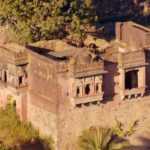Mount Abu Travel Information, located in the Aravalli Range in the Indian state of Rajasthan, is a captivating hill station and a popular tourist destination. Nestled amidst lush green forests and surrounded by breathtaking landscapes, Mount Abu offers a tranquil escape from the bustling cities of India. With its pleasant climate, stunning natural beauty, and rich cultural heritage, it attracts tourists from all over the world.
One of the main attractions in Mount Abu is the Dilwara Jain Temples, known for their intricate marble carvings and exquisite architecture. These temples, built between the 11th and 13th centuries, are a fine example of Jain art and craftsmanship. Visitors can marvel at the detailed carvings depicting stories from Jain mythology.
Another must-visit place is Nakki Lake, a serene lake surrounded by hills and offering boating facilities. Visitors can enjoy a peaceful boat ride or simply relax by the lake, soaking in the scenic beauty. The nearby Toad Rock is a popular spot for trekkers and offers a panoramic view of the surrounding hills.
Mount Abu is also home to the Achalgarh Fort, an ancient fort built in the 14th century. The fort houses the Achaleshwar Mahadev Temple, dedicated to Lord Shiva. The temple is renowned for its 4.6-meter-tall brass statue of Nandi, Lord Shiva’s divine bull Mount Abu Tour Packages.
For nature enthusiasts, Guru Shikhar, the highest peak in the Aravalli Range, is a must-visit. It offers breathtaking views of the surrounding hills and is a popular spot for hiking and photography.
The Mount Abu Wildlife Sanctuary is another attraction that shouldn’t be missed. Spread over an area of 290 square kilometers, it is home to a variety of flora and fauna, including panthers, bears, and numerous bird species. Visitors can take a safari through the sanctuary and experience the thrill of spotting wildlife in their natural habitat.
Besides these attractions, Mount Abu also hosts the famous Summer Festival, a three-day cultural extravaganza held during the month of May. The festival showcases Rajasthani folk dances, music performances, and a colorful procession.
With its picturesque landscapes, ancient temples, and cultural festivities, Mount Abu offers a unique and refreshing experience for tourists. Whether you are seeking spiritual solace, natural beauty, or an adventurous getaway, this hill station has something to offer for everyone.
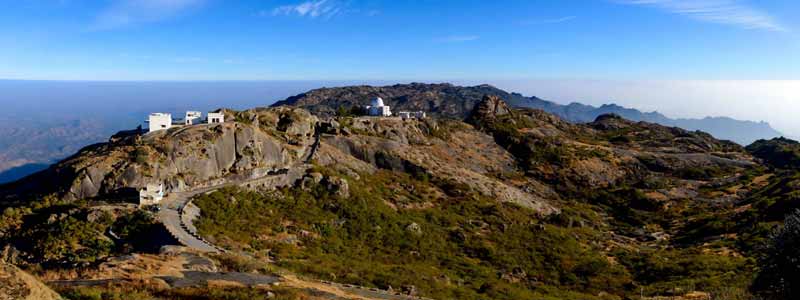
History of Mount Abu
The history of Mount Abu is rich and dates back to ancient times. The region holds significant importance in terms of cultural, historical, and religious heritage.
According to archaeological evidence, Mount Abu was inhabited by various tribes and communities as early as the 6th century BCE. The area was known as “Arbuda Anchal” and is mentioned in ancient Hindu scriptures like the Puranas.
In the 11th and 12th centuries CE, Mount Abu came under the control of the Chauhan dynasty, and it became a significant center of Rajput power. The famous Dilwara Jain Temples, known for their intricate marble carvings, were constructed during this period by Vastupal and Tejpal, ministers of the Chauhan ruler.
Over the centuries, the region saw the rise and fall of various dynasties, including the Parmar dynasty and the Mewar kingdom. The Rajput rulers were instrumental in promoting art, culture, and religious activities in the region. They built several temples and forts, contributing to the architectural and historical significance of Mount Abu.
During the medieval era, Mount Abu faced invasions by several outside forces. In the early 14th century, the region came under the control of the Delhi Sultanate and later the Mughal Empire.
In the 19th century, the British colonialists took over Mount Abu, and it became a summer retreat for the British officers due to its pleasant climate. They established administrative offices and built the famous “Bikaner House” as a summer residence.
After India gained independence in 1947, Mount Abu became a part of the newly formed state of Rajasthan. Since then, it has developed as a prominent tourist destination due to its scenic beauty, historical monuments, and religious significance.
Today, Mount Abu remains a popular hill station and pilgrimage site, attracting tourists and devotees from all over the world. The region continues to preserve its ancient temples, forts, and traditions, making it a unique blend of historical heritage and natural beauty.
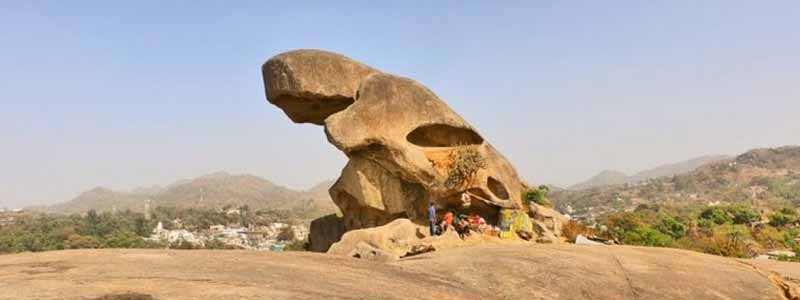
Places to Visit in Mount Abu
Mount Abu, a picturesque hill station in Rajasthan, offers a plethora of attractions for visitors to explore. Here are some of the must-visit places in Mount Abu:
Dilwara Jain Temples: These exquisite temples are renowned for their intricate marble carvings and architectural brilliance. The temples, dedicated to Jain Tirthankaras, showcase impeccable craftsmanship and are a significant pilgrimage site for Jains.
Nakki Lake: Situated in the heart of Mount Abu, Nakki Lake is a serene and picturesque water body. Visitors can enjoy boating, take a leisurely stroll along the promenade, or simply relax amidst the beautiful surroundings.
Guru Shikhar: As the highest peak in the Aravalli Range, Guru Shikhar offers breathtaking panoramic views of the surrounding hills and valleys. It’s a popular spot for nature enthusiasts and adventure seekers.
Achalgarh Fort: This ancient fort, located at a distance of 11 km from Mount Abu, is a historical marvel. It houses the Achaleshwar Mahadev Temple and offers panoramic views of the surrounding countryside.
Mount Abu Wildlife Sanctuary: Nature lovers can explore the diverse flora and fauna in this sanctuary. It is home to a variety of wildlife, including panthers, sloth bears, and numerous bird species.
Sunset Point and Honeymoon Point: These viewpoints provide stunning vistas of the setting sun and the surrounding landscape. They are popular spots for tourists to witness mesmerizing sunsets and capture memorable photographs.
Trevor’s Tank: A serene and secluded spot, Trevor’s Tank is a man-made reservoir surrounded by rocky hills. It attracts bird watchers as various species of migratory birds can be spotted here.
Adhar Devi Temple: Located inside a cave, this temple is dedicated to Goddess Durga. Visitors need to climb a flight of 365 stairs to reach the temple and seek blessings.
Gaumukh Temple: Situated at the origin of the River Saraswati, this temple holds religious significance for Hindus. It is believed that sage Vashishtha performed a yagna at this spot.
These are just a few highlights of the many attractions that Mount Abu has to offer. The hill station’s natural beauty, historical sites, and religious significance make it a captivating destination for tourists.
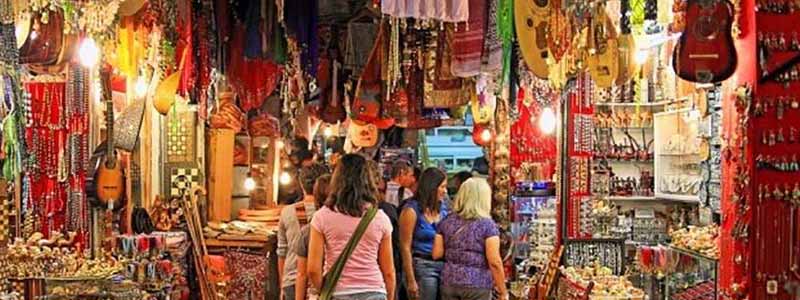
Famous Shopping Markets in Mount Abu
Mount Abu offers a vibrant shopping experience with its bustling markets and unique handicrafts. Here are some famous shopping markets in Mount Abu:
Nakki Lake Market: Located near Nakki Lake, this market is a popular shopping destination for tourists. It offers a wide range of items, including Rajasthani handicrafts, textiles, jewelry, souvenirs, and traditional Rajasthani outfits like Bandhani sarees and turbans.
Khadi Bazaar: As the name suggests, this market specializes in Khadi products, which are hand-spun and handwoven fabrics. Visitors can find a variety of Khadi garments, including shirts, sarees, and shawls, as well as other handicrafts and souvenirs.
Rajasthali: Situated near the main bus stand, Rajasthali is a government-run emporium that showcases and sells authentic Rajasthani handicrafts. It offers a wide range of items such as textiles, paintings, pottery, wooden artifacts, jewelry, and camel leather products.
Tibetan Market: Located near the main market area, the Tibetan Market is known for its Tibetan artifacts and handicrafts. Visitors can find a variety of items like carpets, rugs, thangkas (Buddhist paintings), prayer wheels, jewelry, and other souvenirs with a distinct Tibetan influence.
Abu Road Market: Located in the nearby town of Abu Road, this market is known for its local produce, including spices, pickles, and traditional snacks. It is also a great place to buy Rajasthani fabrics, textiles, and handicrafts.
Shilpgram: Situated on the outskirts of Mount Abu, Shilpgram is a rural arts and crafts complex that showcases the rich cultural heritage of Rajasthan. It hosts a variety of craft exhibitions and fairs where visitors can purchase traditional handicrafts directly from the artisans.
Municipal Market: This market is known for its fresh fruits, vegetables, and local spices. It’s a great place to experience the local flavors and stock up on ingredients for cooking.
These markets offer a wide range of products, allowing visitors to take a piece of Mount Abu’s vibrant culture and craftsmanship back home. Whether you’re looking for traditional textiles, handicrafts, or local delicacies, these markets have something to offer for every shopper.
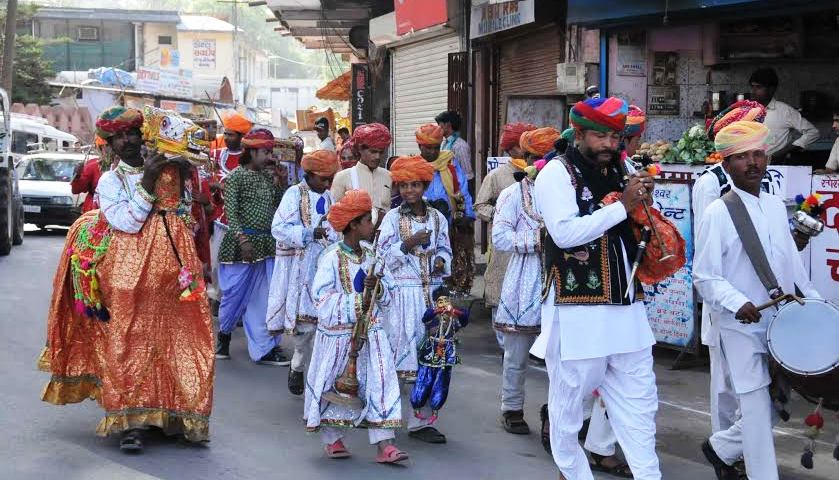
Festivals of Mount Abu
Mount Abu, known for its rich cultural heritage, celebrates several vibrant festivals throughout the year. These festivals showcase the traditional customs, religious rituals, and artistic performances of the region. Here are some of the popular festivals celebrated in Mount Abu:
Summer Festival: The Summer Festival is one of the most awaited festivals in Mount Abu and is held during the month of May. It is a three-day extravaganza that celebrates the arrival of the summer season. The festival features folk music and dance performances, boat races at Nakki Lake, a mesmerizing fireworks display, and a colorful procession showcasing the cultural diversity of Rajasthan.
Gangaur Festival: Gangaur is a traditional festival dedicated to Goddess Parvati, celebrated with great enthusiasm in Mount Abu. It usually falls in March/April and is predominantly a women’s festival. Women dress in colorful attire, carry beautifully decorated clay pots on their heads, and offer prayers to the goddess for marital bliss and a prosperous life. The festival involves vibrant processions, music, and dance performances.
Navratri: Navratri, meaning “nine nights,” is a major Hindu festival celebrated in Mount Abu with immense devotion. It marks the victory of good over evil and honors the Goddess Durga. The festival involves vibrant folk dances, such as Garba and Dandiya, performed by men and women dressed in traditional attire. The entire town comes alive with music, dance, and religious ceremonies during this period.
Diwali: Diwali, the festival of lights, is celebrated with great fervor and enthusiasm in Mount Abu. The town is adorned with colorful lights, diyas (earthen lamps), and decorations. People exchange sweets, burst firecrackers, and offer prayers to deities. The festival signifies the triumph of light over darkness and is a time for family gatherings and festivities.
Winter Festival: The Winter Festival is a two-day cultural extravaganza held in December. It showcases the rich heritage, folk traditions, and artistic performances of Rajasthan. The festival features puppet shows, music and dance performances, sporting events, and a grand procession. Visitors can also enjoy various competitions, including tug-of-war, cricket matches, and kite flying.
These festivals not only offer a glimpse into the vibrant culture and traditions of Mount Abu but also provide an opportunity for locals and tourists to come together and celebrate with joy and enthusiasm. The town comes alive with music, dance, colors, and a festive spirit during these occasions, making them an unforgettable experience for visitors.
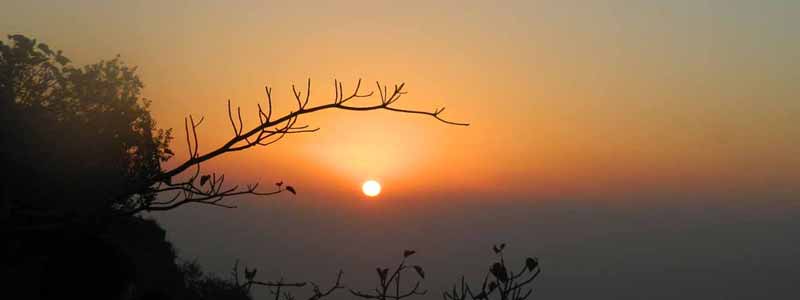
Best Time to Visit Mount Abu
The best time to visit Mount Abu is during the months of February to June and September to December when the weather is pleasant and suitable for outdoor activities and sightseeing. Here’s a breakdown of the different seasons in Mount Abu:
Summer (March to June): Summers in Mount Abu are relatively mild compared to other parts of Rajasthan, making it an ideal escape from the scorching heat. The temperature ranges from 23°C to 36°C (73°F to 97°F). It is a popular time to visit for tourists seeking respite from the heat and to enjoy outdoor activities like boating in Nakki Lake and exploring the natural beauty of the region.
Monsoon (July to September): Mount Abu experiences moderate rainfall during the monsoon season. The weather is pleasant, and the hills and valleys come alive with lush greenery. However, heavy rainfall can sometimes lead to landslides, so it’s important to check the weather conditions before planning a visit during this time.
Post-Monsoon (October to November): The post-monsoon period is one of the best times to visit Mount Abu. The weather remains cool and pleasant with temperatures ranging from 17°C to 33°C (63°F to 91°F). The lush green surroundings and clear skies make it an ideal time for nature walks, trekking, and enjoying the natural beauty of Mount Abu.
Winter (December to February): Winters in Mount Abu are cold but not extreme. The temperature ranges from 7°C to 25°C (45°F to 77°F). The cool weather creates a cozy atmosphere, and it is a great time for sightseeing, exploring the famous Dilwara Jain Temples, and enjoying the local festivals like the Winter Festival. Warm clothing is recommended during this season.
It’s important to note that Mount Abu can get crowded during peak tourist seasons like summer vacation and long weekends. Therefore, if you prefer a quieter and less crowded experience, consider visiting during the shoulder seasons of February to March or October to November.
Overall, the best time to visit Mount Abu depends on your preferences, whether you enjoy pleasant weather, outdoor activities, or festive celebrations. Plan your visit accordingly to make the most of your trip to this beautiful hill station.

How to Reach Mount Abu
Mount Abu is well-connected to various cities in Rajasthan and neighboring states. Here are the different modes of transportation to reach Mount Abu:
By Air: The nearest airport to Mount Abu is Maharana Pratap Airport in Udaipur, which is approximately 176 kilometers away. From the airport, you can hire a taxi or take a bus to reach Mount Abu. Udaipur is well-connected to major cities in India, and there are regular flights from Delhi, Mumbai, and Jaipur, among others.
By Train: The nearest railway station to Mount Abu is Abu Road Railway Station, located at a distance of about 28 kilometers. It is well-connected to major cities in India, including Delhi, Mumbai, Ahmedabad, Jaipur, and Jodhpur. From Abu Road, you can hire a taxi or take a local bus to reach Mount Abu.
By Road: Mount Abu has good road connectivity with nearby cities and towns. You can reach Mount Abu by road through private vehicles, taxis, or state-run buses. The hill station is connected to major cities like Ahmedabad (222 km), Udaipur (165 km), Jodhpur (285 km), and Jaipur (494 km) by well-maintained roads.
State-run buses and private operators provide regular bus services to Mount Abu from cities like Ahmedabad, Udaipur, and Jaipur. There are also options for luxury buses and Volvo coaches for a more comfortable journey.
Local Transportation: Once you reach Mount Abu, you can easily explore the town using local transportation options. Taxis, auto-rickshaws, and private cabs are readily available for local travel. You can also rent a bike or scooter to move around and explore the hill station at your own pace.
It’s advisable to check the availability and timings of flights, trains, and buses in advance, especially during peak tourist seasons. Also, keep in mind the weather conditions and any ongoing road or rail works that may affect your travel plans.
Overall, Mount Abu is accessible by air, train, and road, and you can choose the mode of transportation that best suits your convenience and preferences.







